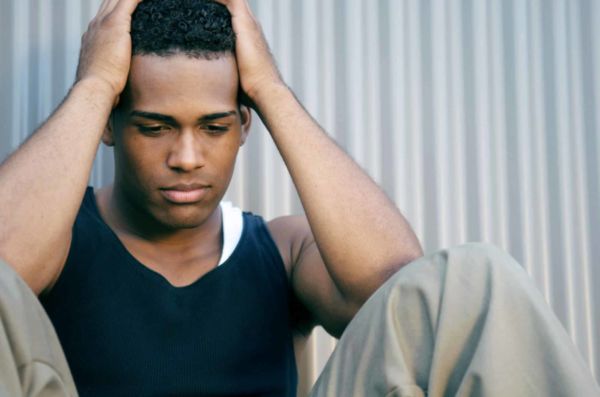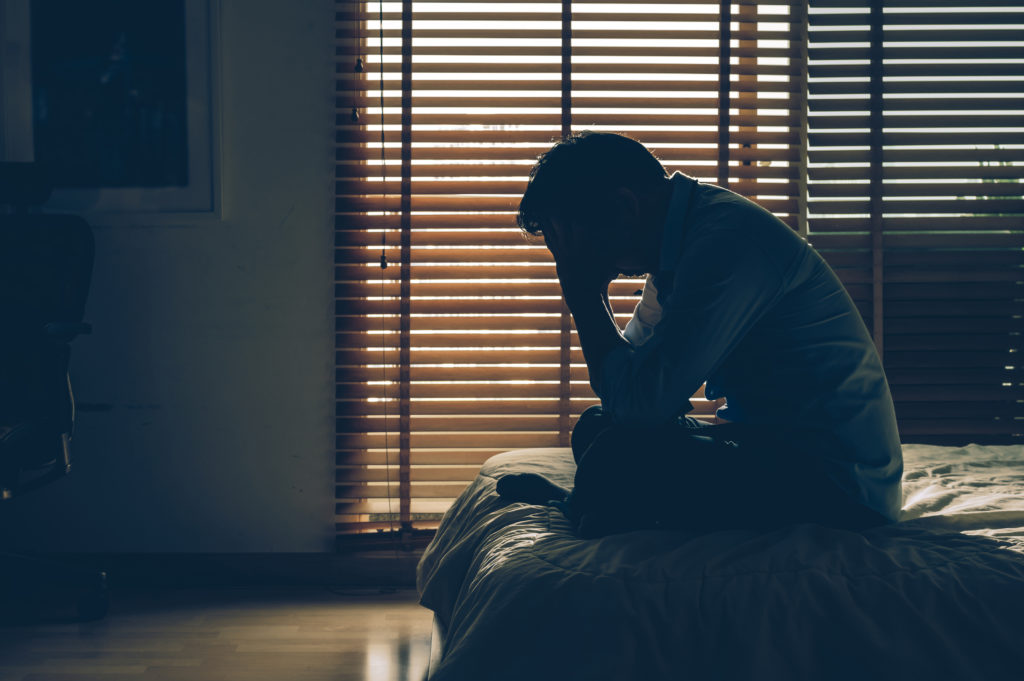According to the National Institute of Mental Health, 21 million adults in the United States have struggled with major depression. While women struggle at twice the rate of men, some barriers to recognizing depression in men make a gender-specific approach to the treatment necessary for one of the most common mental disorders.
Symptoms of depression in men typically present themselves through behaviors that aren’t commonly correlated with this condition. Consequently, it’s imperative to understand how depression symptoms manifest in men, so effective treatment modalities are used. Untreated depression can impact all areas of a man’s life, affecting relationships, jobs, general well-being, risk-taking behavior and more. Despite recent gains in equality, female depression is considered a more acceptable mental health issue than depression in men. A stigma regarding mental health issues for men persists, preventing many from reaching out for help. This has clinical implications for treating severe and moderate depression in men.
How Do Men Handle Depression?
Chief among the challenges of treating depression symptoms in men is that they typically handle depression differently than other genders. If a man is having suicidal thoughts, for example, he might be less likely to tell someone because of the stigma attached to mental health issues for men.
Moreover, gender-related differences in the discussion of depression make many men feel they should turn their negative emotions inward and stay quiet about issues relating to mental health. Men may feel uncomfortable expressing feelings regarding depression because they feel it will be considered a sign of weakness.
While male symptoms of depression might manifest differently, many are common to men and women. Some typical symptoms of depression include:
- Persistent feelings of sadness or hopelessness
- Lack of enjoyment in once pleasurable activities
- Difficulty sleeping or sleeping too much
However, sex differences in depressive symptoms mean that men may also act out in other ways to show their depression. Some of these ways include:
- Abusing substances like drugs and alcohol
- Taking extreme or unnecessary risks
- Spending more time in activities that help them escape the realities of life (playing video games or watching TV for hours on end)
- Working longer hours than needed
- Experiencing physical symptoms, including issues with digestion or frequent headaches
- Behaving violently or trying to control and overpower other people

Men vs. Women
The way men handle depression differs from women, partially due to societal standards for this mental health condition and biological considerations. For instance, one depression-related gender difference is that women are twice as likely to struggle with depression due to hormonal shifts related to childbirth.
Conversely, women tend to be more likely than men to share their experiences with depressive symptoms because it’s more socially acceptable. Regarding family members and friends, women aren’t generally ostracized or considered weak for discussing mental health the way men may be.
Sex differences in depression affect not only public health attitudes toward depression in men but also the availability of targeted treatment.
Why Do Men Get Depressed?
Men experience depressive symptoms for many different reasons. Some men deal with clinical depression resulting from chemical imbalances in the brain. Others deal with severe depression that’s more situational, triggered by trauma or stress.
Compounding the challenges, one of the reasons many men turn to substance abuse to cope with depression is that it masquerades as an antidote to depressive symptoms. At the same time, it temporarily blocks the experiences that triggered the symptoms in the first place. This leads to more substance abuse – a sign of untreated depression.
What Underlying Factors Can Cause Depression?
There isn’t just one cause for the development of depression and the disparity in the ways different genders experience and deal with the illness. Some of the general, non-gender-specific risk factors that can contribute to the cause of depression in men include:
- Stressful life events, such as death, divorce, job loss, illness or abuse
- Genetic predisposition
- Loneliness
- Substance abuse
Personality Disorder and Depression
Personality disorders are linked to the development of major depression. Personality disorders with negative emotional symptoms can cause depression symptoms to develop or worsen. Depending on the mental illness, men might be caught in a cycle of poor decision-making, intrusive or suicidal thoughts, persistent voices and more.
The comorbidity between some personality disorders and male depression leads many public health professionals to recommend a treatment plan that treats both issues concurrently.

Bipolar Disorder and Depression
Among the different personality disorders, bipolar disorder is closely aligned with major depressive disorder. Bipolar disorder is characterized by extreme shifts in mood, with individuals going from a manic state to a depressed mood cyclically.
Bipolar disorder presents differently depending on the individual. When individuals with bipolar disorder shift to a depressed mood, they experience many of the same symptoms as those with major depressive disorder. For example, some men and women with bipolar disorder experience mood shifts daily (or even several times a day); others can go weeks or months in one state before shifting to the other.
Other Mental Health Factors That Contribute to Depression
Other mental health factors contributing to depression in men include significant life changes (even positive ones), additional physical or mental comorbidities and hormonal shifts. Eating disorders, drug abuse and challenges with gender identity may also contribute to depression in men.
How Can Depression Be Treated?
There are numerous treatment modalities for male depression, many of which are centered on addressing the symptoms of depression. Depending on how severe the depression is, treatment can be administered on an outpatient basis or may require inpatient care.

Medication vs. Continued Care
Medication is the most common method of treating male depression. Most mental health professionals believe medication to address imbalances in the brain’s neurotransmitters (dopamine, norepinephrine and serotonin) effectively relieves symptoms. Medications typically fall under one of several categories:
- Selective serotonin reuptake inhibitors (SSRIs): This is the first line of defense in treating male depression and includes brand names like Zoloft, Paxil, Lexapro and Prozac. These medications increase the amount of serotonin in the brain.
- Serotonin and norepinephrine reuptake inhibitors (SNRIs): These simultaneously work on two types of neurotransmitters and include brand names like Cymbalta and Effexor. They help balance brain chemistry and thereby regulate mood to relieve a patient’s symptoms of depression.
- Miscellaneous antidepressants: These medications don’t fit neatly into one category because they each help with male depression differently but include brand names like Trazodone, Remeron and Wellbutrin.
- Monoamine oxidase inhibitors (MAOIs): These are medications prescribed when others haven’t worked and include brand names like Marplan and Nardil. MAOIs create more dopamine, norepinephrine and serotonin to counter the removal of these chemicals due to the monoamine oxidase enzyme. These medications have harsher side effects than some of the other antidepressant types and have high interactions with other medicines and foods, so they’re prescribed sparingly.
Continued care could include ongoing cognitive therapy to work through the emotional and circumstantial issues contributing to depression. Many mental health professionals recommend a combination of medical and continued care to moderate the symptoms of depression. This is especially true for men who’ve struggled with suicidal thoughts and are dealing with substance use disorder and depression symptoms.
Contact a Local Mental Health Services Facility
Mood disorders can adversely impact a person’s life in many ways, sometimes creating permanent and devastating rifts. Negative feelings can become overwhelming to the point where minor depression can turn into major depressive disorder and a genuine mental health crisis. If you or a loved one is suffering from the effects of male depression, working with a local mental health services facility is the best way to get the help necessary to return to normal.
As the symptoms of depression are varied and sometimes accompanied by suicidal thoughts, getting professional help quickly is essential.
Depression Treatment Near Austin, TX
Because men are often less likely to share their struggles, they’re sometimes more prone to have untreated depression. They don’t have the emotional support necessary to overcome the negative feelings associated with major depression, which can lead them down a dark path. This can ultimately result in destructive behavioral patterns, suicidal ideation and worsening overall mental health.
Seeking treatment geared toward men — and getting it as early as possible — provides men the best chance of recovering and managing major depression.
Alta Loma offers mental health programs for men in crisis dealing with severe depression. Take the first step today by calling 866-457-3843 to learn how we can help you reclaim your life.



